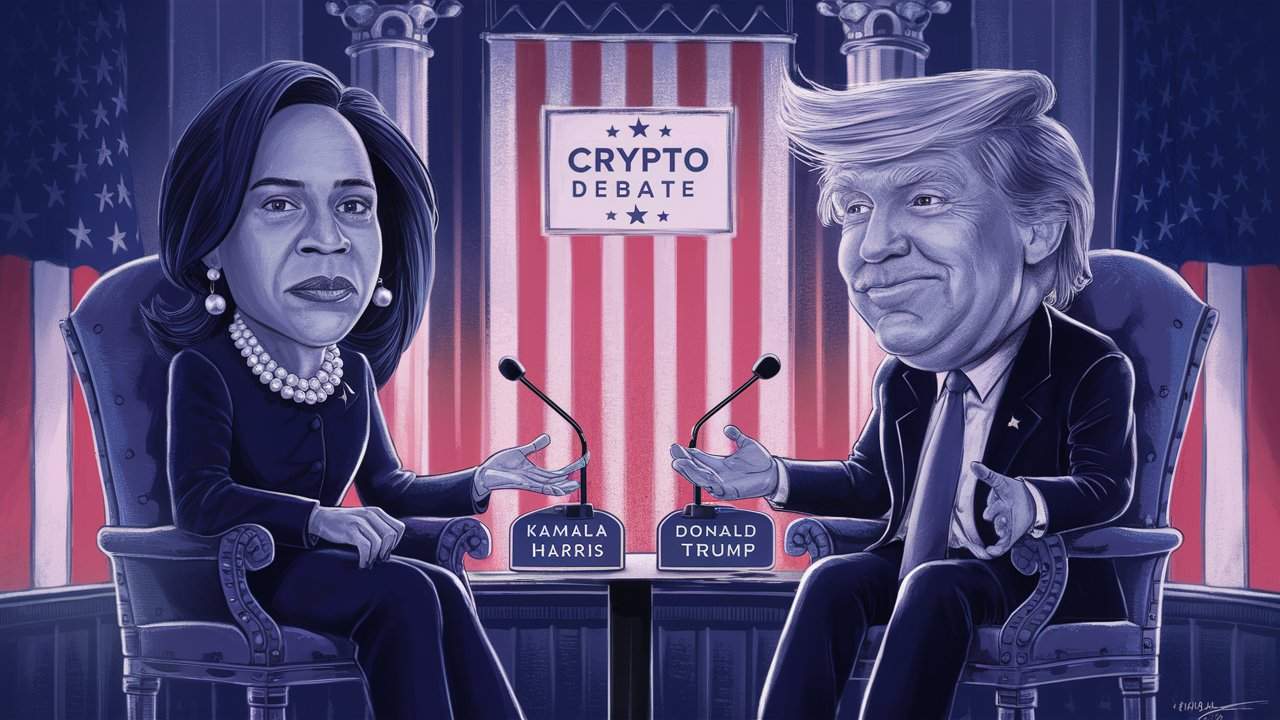
U.S. Vice President Kamala Harris is under increasing pressure to create a clear crypto agenda. As the likely Democratic presidential nominee, Harris must address the concerns of the crypto community. The Official Monetary and Financial Institutions Forum (OMFIF), a financial think tank, stresses the urgency of this issue.
The crypto community often supports small government ideologies, aligning many with the Republican party. This shift has benefited the Republicans, particularly former President Donald Trump. OMFIF warns that not having a defined crypto policy could result in significant political and financial losses to Trump.
Last week, Trump spoke at the Bitcoin Nashville conference. He promised to accept campaign donations in cryptocurrency and build a national Bitcoin reserve if re-elected. “If the Democrats kept the White House, that would be a disaster for crypto,” Trump claimed.
Trump’s proposals have appealed to the crypto community. He suggested acquiring 200,000 Bitcoin annually for five years to secure a significant share of 21 million Bitcoin. Lewis McLellan, editor of OMFIF’s Digital Monetary Institute, believes this strategy could drive Bitcoin prices up and attract donations from those with significant Bitcoin holdings.
McLellan also criticized the Democrats’ current approach. He stated, “Senior Democrats have done nothing to persuade the crypto community that they represent its interests.” The Democratic Party’s stance, marked by regulatory uncertainty and aggressive SEC actions, has alienated many in the crypto industry.
Democratic Efforts and Harris’s Potential Crypto Policy
On August 2, Fox News’ Eleanor Terret reported that Congressman Ro Khanna would host a key meeting on August 5. This meeting aims to gather leaders from the crypto industry, Democratic politicians, and representatives from the Harris campaign to establish a “fresh start” with the sector. However, there is skepticism about the timing and effectiveness of these efforts, with critics arguing that discussions alone may not be enough to sway voters.
Harris has yet to officially state her position on crypto. According to a Politico report, she is “signaling a new openness,” her camp has contacted crypto representatives in recent weeks. The report also noted a crypto rift among Democrats, indicating policy tensions beneath the surface.
OMFIF’s commentary, “Harris cannot afford to cede crypto to Trump,” emphasized the potential gains for Harris. The think tank urged Harris to outline her own agenda for crypto assets or risk losing ground to the Republicans. Supporting bipartisan legislation like the Financial Innovation and Technology for the 21st Century Act (FIT21) and the Stablecoins Act could signal a significant policy shift.
OMFIF believes embracing crypto policy could attract votes and campaign donations from the crypto community, which could be pivotal in key battleground states. By adopting a more conciliatory approach toward the crypto industry, Harris could regain some control over this issue. The think tank argues that treating crypto as a nonpartisan issue would lead to fairer and more robust legislation, benefiting both the industry and the country.
Also read: How to Make an NFT
Trump’s Pro-Crypto Stance and Democratic Struggles
Trump’s influence within the Republican party has seen the adoption of an overtly pro-crypto stance. His promises include the dismissal of SEC Chair Gary Gensler and the creation of a US Bitcoin reserve. Trump’s acceptance of crypto donations and industry championing have positioned him as a leading advocate for crypto enthusiasts. Republican lawmakers are pushing for government adoption of Bitcoin and self-custody rights.
In contrast, the Democratic Party has struggled to win over the crypto community. Unlike regions like the EU and Singapore, the US has lagged in providing clear regulatory frameworks for crypto businesses. Legislative efforts like the FIT21 Act have faced opposition from key Democrats, including Senator Elizabeth Warren. The SEC’s enforcement actions have added to the regulatory uncertainty, particularly its contentious lawsuits. President Joe Biden’s veto of a bill aimed at reversing SEC guidance that complicates banks’ ability to hold digital assets further cemented the administration’s negative stance.
According to OMFIF, Harris has the opportunity to reshape the narrative. She could signal a significant shift by supporting existing legislative efforts and promoting regulatory clarity. This move could attract support and donations from the sector, potentially swaying voters in key battleground states. Proper regulation, balancing risks and opportunities, is crucial for the U.S. economy and should transcend partisan politics.
As the crypto policy landscape continues to evolve, these developments will likely be a key topic of discussion at Benzinga’s Future of Digital Assets event on November 19. Industry leaders and policymakers will gather to explore the future of cryptocurrency regulation and its impact on the broader financial ecosystem.
From our partners On Chain Media: The Rise of Blockchain-based Video Streaming: Exclusive Interview With Replay CEO Michael Jelen
Discover more from The African Crypto
Subscribe to get the latest posts sent to your email.








